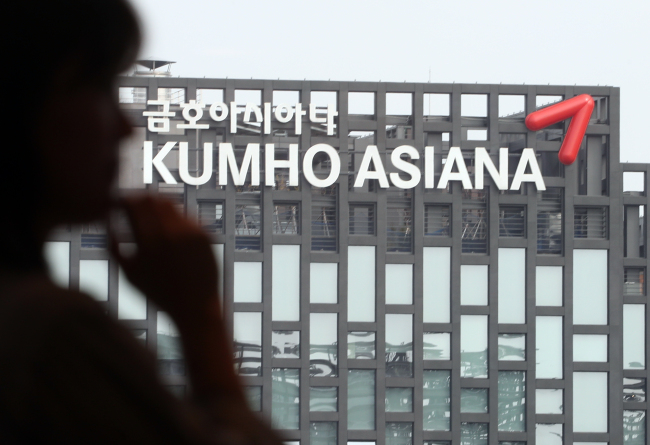Despite the voluntary departure of the Kumho Asiana chairman last week, the main creditors of the conglomerate, which owns South Korea’s second-largest air carrier Asiana Airlines, have demanded that it sell off its high-value assets and draw up a solid loan repayment plan to improve liquidity.
The demands were pushed by Asiana Airlines’ main creditors, including the state-run Korea Development Bank, as a condition for their continued support in normalizing the airline’s financial structure and credit standing, according to market sources Sunday.
If Asiana draws up an acceptable plan, the creditors say they will extend the debt moratorium under a memorandum of understanding on improving the airline’s financial standing. The memorandum, signed in April 2018, expires this week.
 |
(Yonhap) |
The development comes as Kumho Asiana Group faces a major liquidity crisis stemming mainly from losses suffered by Asiana Airlines, which takes up around 60 percent of the group’s revenue and has a debt ratio of over 600 percent.
The impact of the airline’s losses has been rippling through the group’s remaining affiliates -- Kumho Buslines, Kumho Industrial and Asiana IDT -- as they are interlinked under the group’s governance structure.
Last Thursday, Kumho Asiana Chairman Park Sam-koo stepped down from his post as group chairman and co-CEO of Asiana Airlines and Kumho Industrial to take responsibility for the current liquidity crisis.
Trouble began earlier this month when auditor Samil PwC declined to sign off on the 2018 financial statements of Asiana Airlines and Kumho Industrial, citing insufficient information to evaluate the airline’s provisional debt.
The move prompted warnings of credit rating downgrades and a two-day trading suspension for the two companies. The auditor later approved the statements, but the revisions led to a sharp increase in the airline’s net loss and debt ratio. The development prompted investors to flee, prompting a stock price crash.
A day prior to his resignation, Park requested KDB chief Lee Dong-gull ask the main creditor bank to help Asiana normalize its financial structure and avoid a corporate workout.
While pledging support, KDB has asked Kumho Asiana to submit a viable capital financing agenda. Such plans must be approved before the creditor can renew its memorandum, Lee had said.
As of end-2018, Asiana holds around 3.4 trillion won ($2.99 billion) in debt, and it has to repay 1.32 trillion won of the total within this year, according to the company.
Of the total debt, finance leases account for 41 percent and asset-backed securities 36 percent. The amount of debt due to financial institutions account for around 14 percent of the total.
By Sohn Ji-young (
jys@heraldcorp.com)








